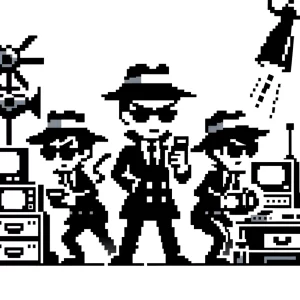
The Rise of “Conspiracies Without Theory
Imagine a conversation where logic and evidence are thrown out the window, where statements shift and contradict themselves within seconds, and where the goal isn’t clarity but rather a spectacle. This isn’t a movie scene; it’s the reality of some online conspiracy circles. Today, conspiratorial thinking is adapting to the digital age, morphing from coherent, albeit flawed, pseudo-scientific arguments into something more visceral: conspiracies without theory.
The transformation is notable—and alarming. Older forms of conspiratorial thinking, which once tried to mimic scientific discussions, are increasingly overshadowed by rapid-fire, emotionally charged “anti-science” dialogue. This shift is more than just a change in tone; it reveals a fundamental transformation in how misinformation spreads and what makes it stick. By looking at the example of the Flat Earth community, we can see how the landscape of conspiracy theories has evolved from a pseudo-scientific approach to one that prioritizes emotion over evidence, especially on social media platforms.
How Flat Earth Believers Evolved Online
The Flat Earth community provides an ideal case study for understanding this shift. Since its re-emergence online, the Flat Earth movement has experienced two distinct phases in its digital presence. In the early days of the internet, conspiracy theories like Flat Earth tended to reside on forums, where discussions were lengthy, jargon-heavy, and attempted (however unscientifically) to offer “evidence” for their beliefs. But as social media gained traction, the tone and content of conspiracies began to change.
In the Flat Earth Society’s traditional online forum, you find users methodically citing sources and constructing detailed, albeit flawed, experiments to “prove” that the Earth is flat. The conversation is often formal, carefully monitored, and surprisingly structured, mirroring traditional scientific discourse. By contrast, the subreddit r/flatearthsociety had a radically different atmosphere before it was shut down: users exchanged one-liners, sarcastic quips, and memes. There, the goal wasn’t careful argumentation but creating shock value and building community through confrontation. The conversations were more emotionally charged, driven by quick responses rather than carefully crafted theories.
This evolution reflects a broader shift in how online conspiratorial communities communicate, particularly when comparing forums to newer social media platforms like Reddit.
A New Type of Conspiracy Thinking
Traditional conspiracy theories might not seem all that different from the “anti-science” conspiracies we see on social media, but the change in style is profound. The older, pseudo-scientific conspiracies, like those discussed in forums, mimic scientific methods—often cherry-picking data, using complex language, and presenting claims as “scientific.” These groups lean on a sort of pseudo-scientific credibility that, while flawed, at least attempts to build a logical framework, however biased.
But social media, by nature, thrives on short, emotionally engaging, and shareable content. Here, we see “conspiracies without theory,” a kind of anti-science communication that focuses on provocations rather than proofs. It’s about repetition and emotionally charged language rather than constructing any coherent narrative. Such conspiracies aren’t trying to build a “truth” but to challenge and disrupt. They thrive on the idea that everything mainstream or “official” is suspicious, and they make heavy use of sarcasm, humor, and antagonism.
On platforms like Reddit, this style of communication aligns with the fast-paced, visually driven nature of the platform. Users are rewarded for making posts that generate immediate reactions, not for providing well-thought-out arguments. The “stickiness” of these ideas comes from their shareability and emotional resonance, not from any logical or scientific rigor.
Why Social Media Drives Anti-Science Narratives
This transformation from pseudo-science to anti-science isn’t just an accident of culture; it’s deeply influenced by how social media platforms function. Traditional forums, such as the Flat Earth Society’s forum, promote longer discussions with structured arguments that try, at least superficially, to be credible. In contrast, Reddit’s structure encourages brief, emotionally charged exchanges that mirror the dynamics of oral storytelling, where quick wit and memorable lines take precedence over logical consistency.
Moreover, social media’s algorithms favor content that garners engagement—likes, shares, and comments—which tends to favor sensational, emotionally charged posts over nuanced or carefully constructed arguments. On a platform like Reddit, a conspiracy post is more likely to thrive if it’s shocking, amusing, or incendiary, rather than if it’s a meticulously crafted piece of “evidence.”
Why This Matters—and Why It’s Harder to Combat
Why does this shift in conspiracy communication matter? For one, it changes how we might counteract misinformation. Traditional methods like fact-checking, debunking, and even educational interventions are less effective against conspiracies without theory. When dealing with pseudo-scientific arguments, debunking can sometimes sway people on the fence by pointing out logical flaws or inconsistencies. But how do you counter an argument that isn’t even trying to be logical? The emotionally driven, anti-science style of conspiracy is harder to counter because it’s resistant to facts by design.
Take, for example, a common assertion in the r/flatearthsociety subreddit: “Pictures are not valid evidence.” This statement doesn’t just deny a particular claim; it dismisses the entire idea of visual proof. Countering this with more photos or data won’t sway someone entrenched in this anti-evidence mindset. Instead, they’re likely to see additional facts as part of the conspiracy—a tactic conspiracies-without-theory often employ to reinforce their members’ distrust of mainstream information sources.
This trend is especially relevant today as conspiracies play an increasingly prominent role in public discourse, often blending into political narratives and influencing real-world events. The shift from pseudo-science to anti-science aligns with broader cultural phenomena like “post-truth” narratives, where emotional resonance often outweighs factual accuracy.
Navigating the Future: What Can Be Done?
Addressing conspiracies without theory requires a new approach. While traditional debunking remains valuable, it alone may not be enough. Combating these narratives might involve engaging on an emotional level, offering counter-narratives that are just as compelling and relatable. Community-based interventions, education that emphasizes critical thinking over rote learning, and media literacy programs tailored for the digital age could all play a role in building resilience to these kinds of emotionally driven conspiracies.
More broadly, understanding that different platforms foster different kinds of discourse can help in designing interventions. The structured, evidence-driven style of older forums invites one type of response, while the meme-driven, emotionally charged style of platforms like Reddit requires another. Efforts to counter misinformation will need to be as varied and flexible as the platforms they target.
Join the Conversation
What strategies do you think could help counter emotionally charged, anti-science narratives? How might we use social media’s unique features to promote factual, engaging content?
In our fast-evolving media landscape, understanding and adapting to these changes in conspiracy discourse is essential. While conspiracy theories may never fully disappear, recognizing how they shift and thrive in different digital spaces gives us a better chance of addressing their impact and promoting informed public discourse.



